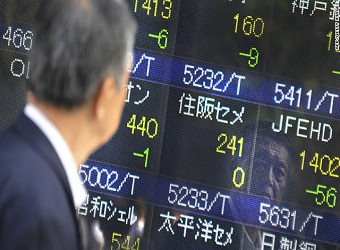Asian stocks retreated, with Japan’s Topix (TPX) index and Nikkei 225 (NKY) Stock Average entering so-called corrections, as commodities fell and the yen strengthened, damping the earnings outlook for Japanese exporters
Honda Motor Co. (7267), which gets 83 percent of sales from overseas, sank 3.4 percent, pacing declines among Japanese exporters. BHP Billiton Ltd. (BHP), the world’s biggest mining company and Australia’s No. 1 oil producer, lost 1.2 percent as crude and copper futures traded near the lowest levels in at least two weeks. Langham (1270) Hospitality Investments Ltd., a hotel operator, slumped 9 percent on its debut in Hong Kong.
The MSCI Asia Pacific Index lost 1.7 percent to 135.64 as of 4:33 p.m. in Tokyo, with about five shares falling for each that rose. All 10 industry groups dropped on the gauge, which is poised to close at the lowest level since April 9. The measure is heading for its first monthly decline in seven months as speculation grows that the Federal Reserve will reduce its bond purchases as the U.S. economy improves and amid signs of an economic slowdown in China.
“Selling is feeding into more selling,” said Soichiro Monji, chief strategist at Tokyo-based Daiwa SB Investments Ltd., which manages the equivalent of about $59.6 billion. “It’s not that the market is tanking because of a special event today. There’s underlying concern about the Fed’s early exit.”
Japan’s Topix, which had risen as much as 83 percent from an almost 29-year low struck on June 4 last year, dropped 3.8 percent. The measure has retreated 11 percent from a five-year high on May 22 to 11 percent, passing the 10 percent threshold some investors use to define a correction.
Fast Plummets
The Nikkei 225 slumped 5.2 percent, also falling more than 10 percent from last week’s high, as Fast Retailing Co., which has a weighting of almost 10 percent on the benchmark index, tumbled by the most since March 2011. The 11 percent plunge by Asia’s biggest clothing retailer accounted for 23 percent of the Nikkei 225’s net decline today.
Shares fell as the yen climbed as much as 0.7 percent to 100.51 against the dollar, a three-week high, before trading at 101.63 as of 3:39 p.m. in Tokyo. A stronger yen cuts the value of overseas earnings at Japanese companies when repatriated.
Even after today’s plunge, the Topix and the Nikkei 225 are still up more than 30 percent this year after the Bank of Japanpledged to attain 2 percent inflation within two years with unlimited bond buying and by doubling the monetary base.
“It’s difficult for the market to keep rallying,” said Angus Gluskie, managing director at White Funds Management in Sydney, who manages more than $400 million. “Apart from volatility caused by the currency and bonds, we are at a juncture where further moves from Japanese equities need to be fundamentally driven.”
Philippine Stocks
Australia’s S&P/ASX 200 Index slipped 0.9 percent, while New Zealand’s NZX 50 Index lost 0.4 percent. Hong Kong’s Hang Seng Index fell 0.3 percent. China’s Shanghai Composite Index retreated 0.3 percent while South Korea’s Kospi index declined 0.1 percent. Taiwan’s Taiex Index and Singapore’s Straits Times Index both slid 1.1 percent
The Philippine Stock Exchange Index sank 3.8 percent, the second-biggest decline among Asia-Pacific benchmarks, as concern valuations are excessive overshadowed data showing the economy grew in the first quarter at the fastest pace in three years.
Futures on the Standard & Poor’s 500 Index fell 0.1 percent today. The index dropped 0.7 percent in New York yesterday amid concern that the Federal Reserve could begin to taper its debt-buying program as the economy continues to improve. Fed Chairman Ben S. Bernankesaid last week the central bank could reduce monetary stimulus if officials see signs of sustained improvement in the economy.
Honda, Panasonic
Shares on the MSCI Asia Pacific Index traded at 13.5 times estimated earnings yesterday, compared with 15 times for the S&P 500 and 13.3 times the Stoxx Europe 600 Index, according to data compiled by Bloomberg News.
Japanese exporters declined. Honda dropped 3.4 percent to 3,875 yen. Toyota Motor Corp., the world’s biggest carmaker, slipped 2.3 percent to 6,060 yen. Panasonic Corp. (6752), Japan’s second-largest television manufacturer, tumbled 4.1 percent to 804 yen.
Raw-material producers dropped. BHP decreased 1.2 percent to A$34.46 in Sydney. Rio Tinto Group, the world’s No. 2 mining company by market value, fell 1.4 percent to A$53.96.
National Australia Bank Ltd. (NAB), the nation’s fourth-biggest lender, fell 1 percent to A$29.32, extending losses for an eighth day, its longest losing streak since November 2010. A gauge ofAustralian banks is down 12 percent this month, heading for its biggest monthly decline since May 2010.
REITs Slump
Langham, a trust backed by Great Eagle Holdings Ltd.’s hotels, slumped 9.8 percent to HK$4.51 on its trading debut in Hong Kong. The company raised net proceeds of HK$4.26 billion ($549 million) for its IPO, selling shares at HK$5 each, the midpoint of its price range between HK$4.65 and HK$5.36.
High-yielding securities across Asia declined today as bond yields jumped. Fortune Real Estate Investment Trust (778), a shopping mall operator in Hong Kong partly owned by billionaire Li Ka-shing’s Cheung Kong Holdings Ltd., sank 4.7 percent to HK$7.35. Keppel REIT, an office landlord partly owned by the world’s biggest builder of oil rigs, slid 3.1 percent to S$1.425 in Singapore.
A measure of Japanese real estate companies in the Topix index extended its decline from an April 12 high to 22 percent. Mitsubishi Estate Co. dropped 5 percent to 2,525 yen, relinquishing its place as Asia’s biggest real estate company by value to Hong Kong’s Sun Hung Kai Properties Ltd. Tokyo Tatemono Co. dropped 8.8 percent to 746 yen, the lowest in a month.
“There could be some knee-jerk reaction to rising U.S. bond yields, which is not good for yield stocks such as REITs,” said Ng Soo Nam, Singapore-based chief investment officer at Nikko Asset Management Asia Ltd., whose Japan-based parent oversees about $165 billion.
Bloomberg



